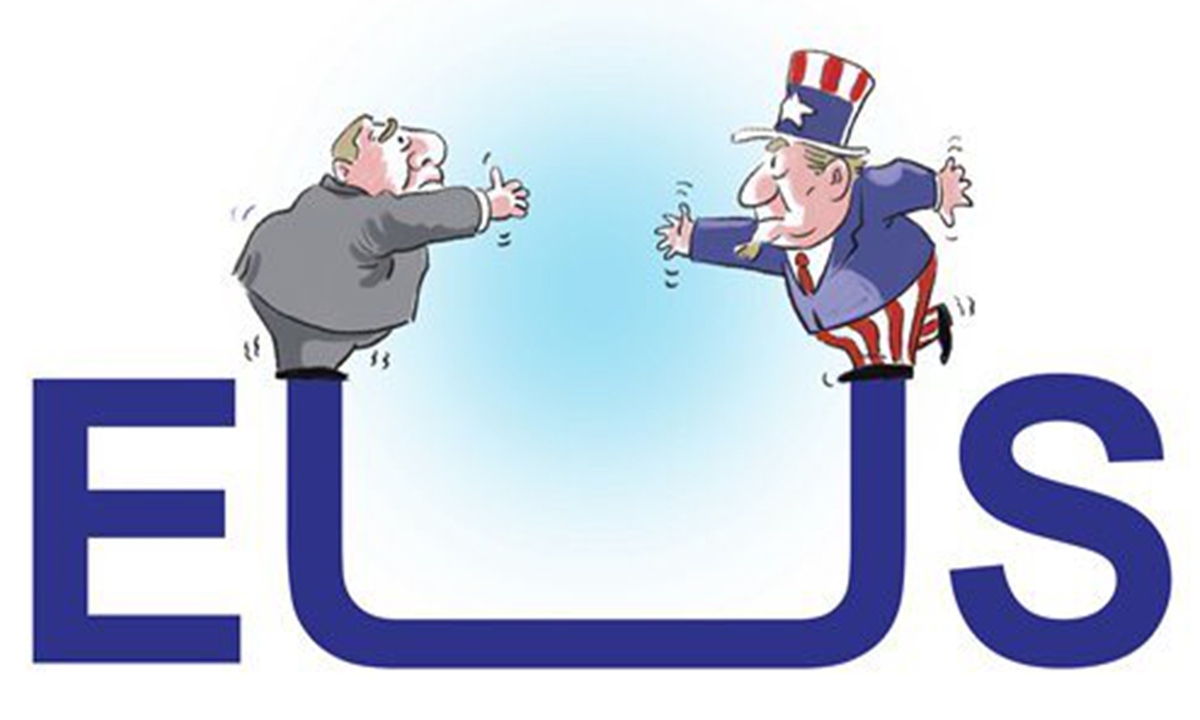How close can EU, US be under Biden?
By Dong Yifan Source: Global Times Published: 2020/11/10 22:08:40

Illustration: Liu Rui/GT
Democratic presidential candidate Joe Biden has won the 2020 election, bringing up discussions about the future of China-US relations. Biden has made strong statements on the so-called human rights abuses in Northwest China's Xinjiang Uygur Autonomous Region and on Hong Kong affairs. In 2012, Biden, as then US vice president, also met with so-called Chinese human rights activists. Likewise, during the China-EU leaders' video conference in September, EU leaders also raised concerns about the Hong Kong and Xinjiang questions.This has made people wonder: After Biden comes into power in 2021, will the EU choose to further coordinate with Washington to target Beijing as a possible gift for the Biden administration?
The US and the EU have always stood on the same front in terms of human rights. Now they seem to reach more consensuses on the issue, especially when the COVID-19 pandemic has exposed the Western society's loopholes in democracy and social governance. Many people have lost confidence in the Western system. This being the case, the US and some European countries have generally become more anxious about China, stepping up to pressure China so as to maintain their so-called dominance or superiority in ideology. Biden has had a strong mind-set of intervention in certain countries, and some European nations somewhat echo Biden in this regard.
After Biden assumes office, the transatlantic alliance will be repaired in some way. The US and Europe will reach more consensuses in terms of economics, governance and ideology so the two sides will also coordinate in actions. In terms of attitudes toward China, both the US and Europe believe that China's constantly rising competitiveness has imposed a certain challenge to them. Biden's coming into power will be the beginning of the US' return to the international system. He will attach more importance to the cooperative relationship with allies. Therefore, Washington and Brussels may have more similarities in their policies and attitudes toward Beijing .
However, this does not mean that European countries will blindly cater to the US. French Finance Minister Bruno le Maire has said the US "has not been a friendly partner for the EU" and "whether Biden or Trump is chosen by the Americans does not change this strategic fact." The EU and the US still have serious disputes on specific issues. For example, in the field of digital economics, no matter which administration is in power, the US will always safeguard its domestic companies' interests. And Europe needs to protect its privacy and intellectual property as well. There are also structural contradictions between the two sides in terms of trade, industry and defense. This will limit the warming up of US-EU relations if Biden takes office.
In 2017, German Chancellor Angela Merkel said that Europe can no longer rely on the US, and the UK, and that Europe had to "take its destiny in its own hands." That was not a last resort for European countries when facing the Trump administration's unilateralism. It is a long-term trend. Whether it is in economics, trade or defense issues, differences between the EU and the US are long-standing. The Trump administration has made European countries fully aware of the insecurities of living under Washington's dominance. Enhancing the autonomy in trade and defense will be a long-term trend in the EU. It is also a way to achieve European integration and to strengthen the EU's unity.
The EU will not try too hard to follow Washington after Biden takes office, because European countries still have their own control over foreign relations. In recent years, the EU has been stressing the importance of strategic autonomy and European sovereignty. It does not want to be easily manipulated by major powers. Although both the EU and the US want to pressure China in certain aspects, European countries will still balance their relations with China and the US, instead of losing their independence.
The author is a research fellow with the Institute of European Studies, China Institutes of Contemporary International Relations. opinion@globaltimes.com.cn
RELATED ARTICLES:
Posted in: VIEWPOINT